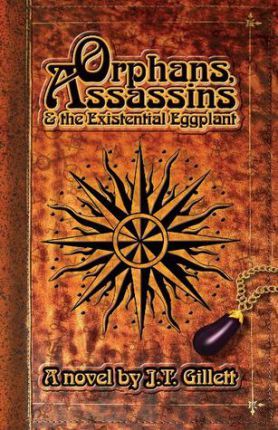Orphans, Assassins and the Existential Eggplant by J.T. Gillett
Orphans, Assassins and the Existential Eggplant by J.T. Gillett
J.T. Gillett holds degrees in philosophy and journalism from the University of Oregon and studied at Naropa Institute’s Jack Kerouac School of Disembodied Poetics. His accomplishments include meditating with Allen Ginsberg, chanting inside the Great Pyramid, climbing Mt. Shasta, marrying the woman of his dreams and raising two children who turned into amazing adults.
In Orphans, Assassins, and the Existential Eggplant, you get a sense very quickly that this will be an extraordinary book.
Besides the whole concept of a talking eggplant (I’m not kidding), there are the wonderful descriptive passage spread liberally throughout the book:
“If Hamdan could read the buxom clouds scattered above the horizon, or the delirious zebra fish swimming below, he’d know he’d be dead before the sun would rise again.”
So goes one of the many fables touched on in this epic ride through the author’s imagination. And, while we are mere readers along for the ride, we are nevertheless transported along with him across sand dunes and through castles, always with an upbeat, quirky bent that defies any kind of generalization.
We follow the protagonist, Aaron Sloopshire, as he encounters a menage of unique and memorable characters in a variety of scenarios, many that leave you weak from laughter — especially at the sarcastic wit of the loquacious eggplant.
At one point, they come upon a strange and lonely woman in the Egyptian desert:
“She had become accustomed to the voices of the wind and sand, and was enraptured by the blood-and-bones in their voices. For the first time in quite awhile, she was certain she was alive. . . . (the woman) looked like a ghost with a suntan.”
In another instance, Aaron has been kidnapped by a nefarious old man named Hassan and forced into service as an assassin. But, before he can carry out his first commission against a knight, he receives a startling revelation: a young woman with whom he had fallen in love early in the book is in the castle with the knight. But she is now a grown woman, and does not remember him at all. She stabs him, but he disarms her quickly and reflects on this unhappy chance encounter:
“While he bandaged his cut, Aaron suddenly saw the world in a brand new light. It was as if someone had sucked the wind out of him and sewed him up so no air and no light could get in. Just darkness.”
What finally happens to Aaron in this unlikely, but well-told tale, I’ll leave you as the reader to discover. At its core, this is a book with many layers — although it is written with a deceptively light touch.
I give it five stars, and offer congratulations to a gifted first-time author.






